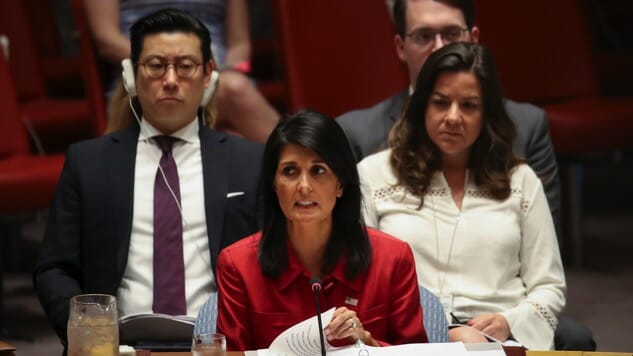The U.N. Floated a Resolution Condemning the Death Penalty for LGBT People. The U.S. Voted “No.”
Photo courtesy of Getty Politics Features LGBT Rights
On Sept. 29, the U.N. Human Rights Council put up a fairly uncontroversial resolution—by western standards, anyway—for a vote. The idea was to condemn those countries which instituted a death penalty for certain acts like “same-sex relations.” Here’s the text of the relevant portions:
The resolution specifically condemns “the imposition of the death penalty as a sanction for specific forms of conduct, such as apostasy, blasphemy, adultery and consensual same-sex relations” and expresses “serious concern that the application of the death penalty for adultery is disproportionately imposed on women.” It also notes “poor and economically vulnerable persons and foreign nationals are disproportionately subjected to the death penalty, that laws carrying the death penalty are used against persons exercising their rights to freedom of expression, thought, conscience, religion, and peaceful assembly and association, and that persons belonging to religious or ethnic minorities are disproportionately represented among those sentenced to the death penalty.”
The resolution passed by a 27-13 margin, and was met with a “yes” vote by every country in the regions of Eastern Europe, Latin America, and the “Western Europe and others group,” with two exceptions. Cuba, which has an abysmal record on LGBT rights, abstained. And the U.S., led by Nikki Haley, voted no.
The UN resolution condemning death penalty for LGBTs passed by 27-13. Here’s who @nikkihaley led in voting NO https://t.co/oeJRY8F8Swpic.twitter.com/a2OhJ2CUcO
— Glenn Greenwald (@ggreenwald) October 3, 2017
There are a few possible explanations for this that go deeper than just “the U.S. won’t publicly support LGBT people.” There’s a clause in there condemning the execution of mentally ill people—executions the U.S. carries out on a routine basis. But the more likely explanation is that our good pals in Saudi Arabia objected specifically to the resolution. It’s one of ten countries where same-sex relations are still punishable by death, and it’s not just an obsolete old law that remains on the books—two transgender people were recently tortured to death by Saudi police. (Also worth reading—this Atlantic piece on homosexuality in Saudi Arabia.)
Saudi Arabia, along with Russia and Egypt, tried to introduce amendments that would “dilute” the impact of the resolution, but these were voted down. (The U.S. supported or abstained from each amendment.) The U.S. has a longstanding strategic alliance with Saudi Arabia, who, along with Israel, is our best ally in the Middle East. Per Nicholas Kristoff in the NYTimes, Saudi Arabia is currently conducting a “war” that amounts to a series of heinous war crimes—the purposeful bombing and starvation of civilians among them—with the support and weaponry of the United States, and we’ve turned a blind eye to their domestic civil rights abuses for a long time.
There’s another explanation, which is that the U.S. simply didn’t want to vote for any bill that criticizes the death penalty in any way. But that would be strange, since although the resolution “recognized” that many states found the death penalty to be a form of torture, it didn’t call for outright abolition—just a humane application in those nations where it still existed.
Regardless of the true reason behind the vote, it’s yet another callous shoulder-shrug by a representative of the Trump administration toward a minority group in the United States.